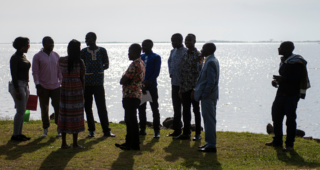As COVID Fatigue Sets In, EGPAF Maintains Focus
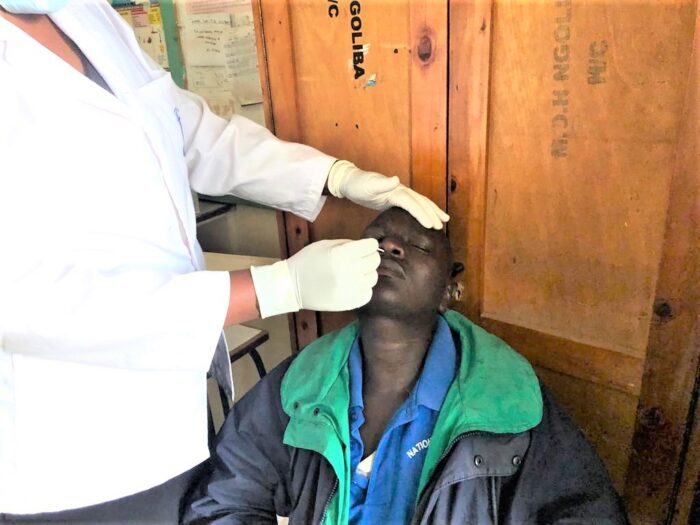
Patrick Muema is a TB patient receiving treatment at the Ngoliba Health Centre in Kiambu County, Kenya. When he came to the clinic recently, a nurse advised him to get a COVID-19 test and educated him about the vaccine.
“This was a good experience for me,” says Patrick. “Initially I was afraid of testing, but now I think I am ready for the vaccine.”
Reaching individuals like Patrick is important as focus around the COVID-19 pandemic wanes. Globally, there has been a general loss of momentum. Eased restrictions have been followed by low adherence to public health prevention measures, such as wearing masks in public spaces, washing hands, and social distancing. In many regions, uptake of vaccines and testing remain low.
In response, the Kenyan government has launched the Targeted Testing Strategy, which underscores testing as critical to the control of the pandemic. Screening and testing, however, remain low because of limited access, misinformation, and stigma.
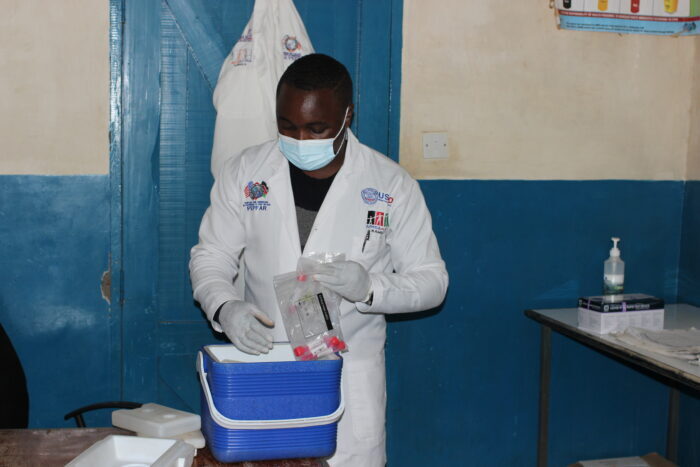
Catalytic COVID-19 Action
To address these issues, the Elizabeth Glaser Pediatric AIDS Foundation (EGPAF) has launched the Catalytic COVID-19 Action (CCA) project, in partnership with UNITAID and FIND. (The project is also being implemented in Cameroon and Zimbabwe.)
“The CCA project [in Kenya] catalyzes government efforts towards managing the COVID-19 pandemics by focusing on integrating COVID testing in clinics in 30 selected facilities in Kiambu County,” says Dr. Calvin Lwaka, the project manager.
Services in these clinics have been frequently interrupted because of seasonal and frequent peaks in infections. Many clients in these clinics are vulnerable to COVID infection due to their low immunity. Integration of COVID testing in these clinics ensures timely identification, isolation, and treatment of COVID-positive cases to contain infections and ensure continuity of these critical services.
The project is also using electronic medical records to document real-time screening and testing data for timely decision making. To promote integration of COVID-19 screening at the point of care, the project is working with healthcare workers—including community health volunteers—to mobilize and promote uptake of testing services.
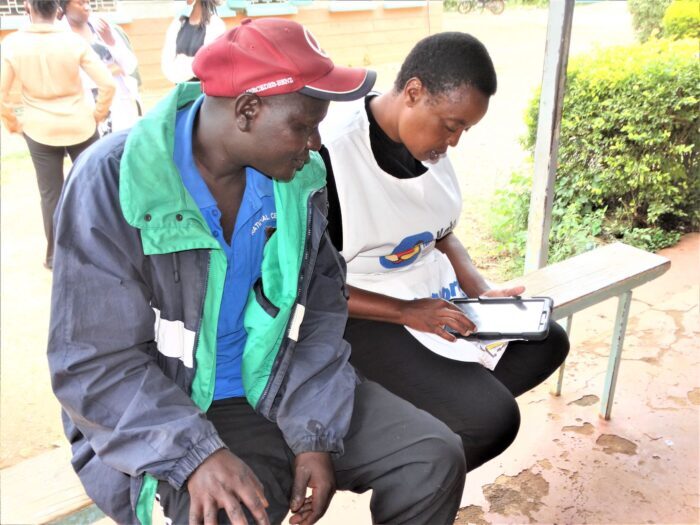
“Integration of COVID testing is picking up well,” says Rahab Ndungú, a community health volunteer at Ngoliba Health Center. “All the patients that I have brought on board and engaged at the HIV clinic have been receptive of screening and testing, especially given that they are able to get these services at the same place.”
Studying Effective COVID-19 Interventions
To enhance long-term COVID-19 responses that are both effective and context sensitive, the project is carrying out the INTEGRATE study in Kenya and Cameroon—integrating rapid antigen testing for COVID-19 in maternal, neonatal, and child health services, as well as in HIV and tuberculosis services.
In Kenya, the study will collect data in a subset of 10 study sites comparing a test-all approach (in which everyone accessing services is offered a COVID-19 test) with the current approach of testing only those who screen positive (meaning that they exhibit COVID-19 symptoms).
The study will compare the outcomes of the two testing strategies and make evidence-driven recommendations to strengthen public health approaches to integrated testing. For effective data collection, the study is working with study nurses to help collect data at the study sites to ensure data quality, recorded real time through the electronic medical records.
“I feel this study is timely, beyond the objectives of this study; it will contribute to the preparedness, learning and response to other future pandemics,” says Magoma Kwasa, M.D., the clinical research officer for Kiambu County.
“Given that the study will be conducted in a public healthcare setting in Kiambu County, with the majority of public health care systems facing the same challenges and opportunities in response, the study findings will be generalizable to the country at large,” says Njoki Kimani, M.D., the county epidemiologist and head of Public Health Emergency Operations.
Strengthening Health Facility and Community Interventions
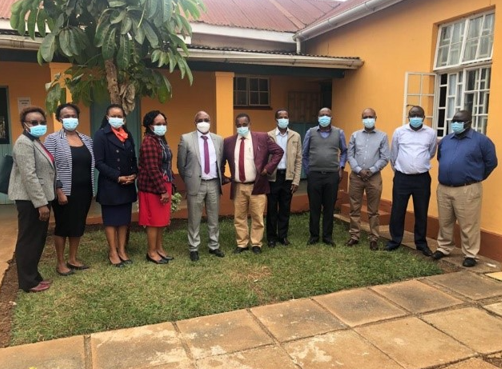
In addition, through a community health strategy, the CCA project intends to increase demand for COVID-19 screening and testing at the community level—countering stigma and misinformation around COVID-19 through community outreaches and sensitization. Community engagement is carried out through planned community dialogue meetings and sensitization through community health volunteers and religious leaders. Screening, testing, and vaccination services are also taken close to the people through health camps in high-population areas.
To strengthen testing, the project is supporting facilities with test kits and personal protective equipment as well as continuous learning for health care workers so that they fully understand the latest information about COVID-19. EGPAF is also providing electronic tablets so that community health volunteers and study nurses can easily collect data.
Dr. Njoki notes that this has been instrumental in maintaining momentum in screening and testing. It is strengthening surveillance and community engagement in the face of declining focus on the pandemic.
“The project came on board at the tail end of the fifth wave in Kenya, with the understanding that the variation in the testing and screening is driven by the waves,” says Dr. Kimani, “The project has helped sustain the momentum in screening and testing. It has also helped sensitize communities and health care workers, bringing about an attitude change on the testing approach and identifying cases previously missed.”
“This project has come at the right time, as testing has been decentralized to all 12 sub-counties with use of Antigen Rapid Diagnostic Tests,” says Joseph Murega, M.D., a member of the County Executive Committee for Health in Kiambu County. Decentralization creates greater capacity and speed of reporting results at the local level.
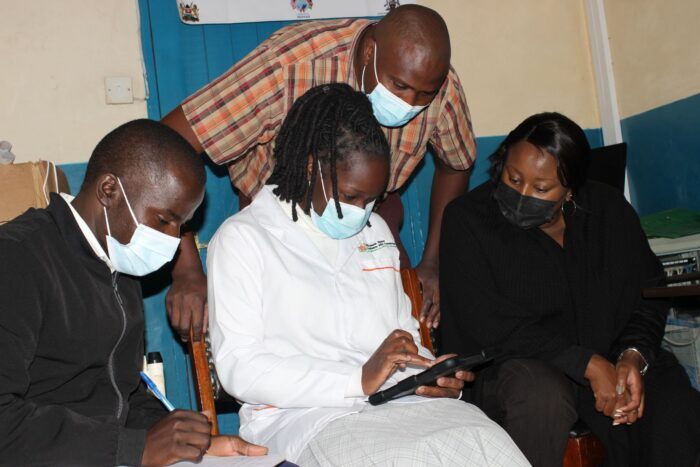
Call to Action
Testing remains central to the COVID-19 response. Strengthening public health care systems is critical to this effort—as is investing in research to inform context-sensitive interventions and increase domestic resources. Universal health coverage and community empowerment must both be prioritized for an effective response.
“We must focus on the integration of COVID-19 testing in routine services to minimize disruption of health services,” says Patrick Nyaga, M.D, chief officer of health, Kiambu County.
Dr. Patrick appreciated the partnership between the Ministry of Health- Kiambu County government and EGPAF, noting that the consensus-building approach has been helpful in identifying shared priorities and working towards them—through the established health systems structures—for sustainability.
“We are excited to contribute to the COVID-19 pandemic response,” says Eliud Mwangi, M.D., the EGPAF-Kenya country director. “Our more than three decades of expertise and the systems we have built in the HIV/AIDS fight provide a great opportunity to mitigate the impact of this new pandemic. EGPAF is committed to support the Ministry of Health and the government in this response”.
Charity Mureithi
Kenya
COVID-19

